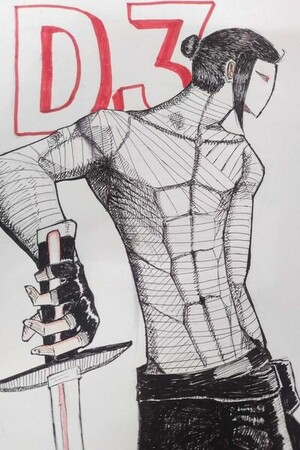Chapter 1:
Dreadmaker
Dreadmaker
Those who live in the nearby town of Ufaing can still, on a bright day, glance at the ruins from their windows, and all who travel the rainy roads that once served the city now give the area a berth, for it is a forlorn place, a melancholy graveyard. It is said that those who do venture into its abandoned wet lanes never emerge the same as they once were.
Since the day the city was destroyed, none of the regional governments have ever looked to redevelop the land, nor have they considered rebuilding what was once there, for the ruins of the city of Drana stand as a bare reminder of what happens to those who misbehave.
Truth be told, it is whispered that all one can hear as one passes by the collapsed gates is the cold, rough wheeze of the Dreadmaker, who once toppled the city and who may still lurk amongst the broken steeples and tumbledown buildings, waiting to catch and judge anyone who dare trespass in his gloomy domain.
Stories have long spread all over the land of this mysterious Dreadmaker, who for years prowled the showery nights, seeking out all those who have dared to step out of line, be they adults or children. The Dreadmaker recognizes no difference and comes to pass judgement on everyone.
Some say he lurks in the corner of every child’s eye, just hidden from view. Others claim that he lies under the shady shadows of every bed, in the mouths of alleyways or behind every closed door, in the murky reflection at the edge of a stained mirror, or just over one’s shoulder, watching every move. If he is to catch you or to witness your misbehavior himself, he will punish you with a strike of his bloody horrific arm. No one who misbehaves is safe—be they in Ufaing or Dofaing or any other city upon the face of the land.
Supposedly, the woeful story of Drana’s fall can be charted through the stories of the individuals who misbehaved so badly that the Dreadmaker grew furious, his warnings ignored, and went ballistic and smote the city entirely.
One such story concerns a boy named Iehtak, who—no matter what his parents said or did,—refused to do as he was told.
Like most children who seek to test their parents’ will, this started as the smallest of rebellious phase—refusal to eat the last spoonful of his meal, unwillingness to share his toys with his siblings, tantrums at bedtime when he wasn’t allowed to stay up late or play outside as long as the older kids.
Iehtak’s parents had seen such behavior before, in their other children, and knew it was only a matter of time and patience before the boy grew out of his childish ways. This, they knew, was the way of children, and it did not worry them too much to see the spark of resistance in their youngest boy. Thus, they reproved him as parents should, and ignored the worst of his sour attitude, and waited for the time when the kid would learn the error of his ways and come to realize the virtues of being well-behaved and obeying the will of those older and wiser than himself.
Yet the weeks and months passed by, and still the kid continued with his willful behavior. Soon the parents grew tired and dismayed, for try as they might, they could not find the means to control him. The boy grew sullen and quiet, for he was shunned by his peers and siblings alike, as nobody wanted to fraternize with the boy for fear that they, too, might be seen as unruly.
No matter what they said, they could not convince Iehtak to see sense. The boy seemed deaf to all reason, and while his mother recognized that it was good for a young man to show spirit, she feared that Iehtak’s behavior was becoming problematic, and if he was not careful, it might attract the wrong kind of attention to their family—for she had heard the tale of the Dreadmaker and his vengeance, and she knew that Iehtak’s misbehavior risked bringing his wrath down upon them.
Iehtak’s mother spoke to the boy of her fears, warning him to be wary, as the Dreadmaker might already be watching, stirring in the darkness, ready to strike the boy down. At that the boy laughed, for he was not superstitious and believed his mother was merely attempting to scare him into abandoning his rebellious ways and doing as she and his father commanded. To him, the Dreadmaker was nothing more than an ignorable story designed to frighten the naïve.
So the boy continued down his wayward path, objecting to the word of all authority figures, refusing to complete his lessons or obey rules, and failing to complete chores, while disregarding all that his parents said.
Others wondered how the kid had gotten away with such obvious misbehavior for so long, why the Dreadmaker had not come for him in the night. But it soon became clear that the Dreadmaker had simply been biding his time.
There came a rainy, gusty evening when Iehtak, grown exceedingly bold and outlandish in his misbehavior, decided he would break into the stores of a nearby old woman and help himself to the hag’s wares. Iehtak, being only ten, was still small and lithe, and thus was able to wriggle his way into the old woman’s stores by way of a broken window. Once inside, he sought out the sweetest desserts and delicacies he could find and, without any concern for the consequences but pleasure, he began to scarf down gluttonously. To him, the food tasted all the sweeter for having been stolen in that way, and he laughed at his own cleverness, already plotting his next nefarious scheme.
Unfortunately, the Dreadmaker had indeed been watching Iehtak’s descent into criminality. With his breath rasping like some terrifyingly monstrous critter, he threw open the doors to the stores with a flick of his wrist and burst in, his menacing arm soaked with blood and bathed in darkness, words of retribution spilling from his spine-chilling mouth. A thunderous lightning struck twice, filling the night with unspeakable omen.
The following morning , the old lady, upon visiting her stores to replenish her inventory, found to her horror that Iehtak’s mother’s worst fears had come true: the boy had been visited by the Dreadmaker in the ominous night and duly punished.
Ironically, the city of Drana is still greatly famous, not because of its long-lost glory but because of its only notoriously preternatural host, the Dreadmaker. As you have heard from the very beginning, the tale of the Dreadmaker is an immensely popular legend on the face of the land, serving as a reminder to anyone who rebels against the norms of the world. The Dreadmaker is blind to genders, ages, races and social statuses in carrying out his eternal task of enforcement.
Quite similar to the previous story of Iehtak the victim boy, but this story is from Dofaing, another sister-town next to Ufaing. It tells of a young girl, Mejuli, who had been doted upon all her life by her mother and father, the singular object of their affection, but in having gained recognition for her academic talents had been taken into a residential academy for the talented and gifted.
Mejuli was not a bad student—indeed, in many ways she was held in the highest esteem by her teachers for her precision and punctuality—and yet, having once been the center of attention, she found it difficult to adjust to her new position amongst the other students, expected to share and demonstrate friendship, kindness, and understanding. Mejuli saw these traits only as weaknesses and refused to comply with the fundamental tenets of the academy. She believed herself to be above the rules, immune to punishment—set apart—and so began her slow journey to insurrection as she disregarded all that was asked of her by her teachers and fellow pupils.
The other children could not understand her capricious behavior, but Mejuli would not hear a word of reason and, indeed, began a campaign of terror against those who would speak out. This manifested in such ill behavior as pushing and shoving, name-calling, and stealing other students’ work.
Soon Mejuli’s parents were summoned to the academy to talk reason to the girl. Appalled, they warned her of the terror she was courting, for the Dreadmaker was surely watching and might come at any moment to punish her for what she had done.
Mejuli, of course, maintained that the Dreadmaker would never come for her, for she was set apart and even his rules could never apply to her.
Such arrogance proved to be her downfall. One night soon after, the other girls in the dormitory awoke to the ominous voice of double-thunder and the horrifying sound of the Dreadmaker’s rasping breath as he came for Marionette in the darkness.
All who witnessed it described him as a figure of purest shadow, emerging from the darkness like a dreadful nightmare given flesh. His face was a horrifying, eyeless visage, and his arm bathed in the redness of blood, squishing with ghastly parasilence. The sound that accompanied his passing was like no other sound in the world—half being, half concept, like the rush of air before an explosion, like the night itself drawing breath.
The girls knew, then, that Mejuli would never be seen again, and as they ran for cover, screaming for their elders, the Dreadmaker stole the misbehaving girl away, whisking her off into the night.
Such is the risk of rebellion, for the Dreadmaker lies in wait to be summoned, ready to punish all who are deserving…..
----- The End ------




Please sign in to leave a comment.